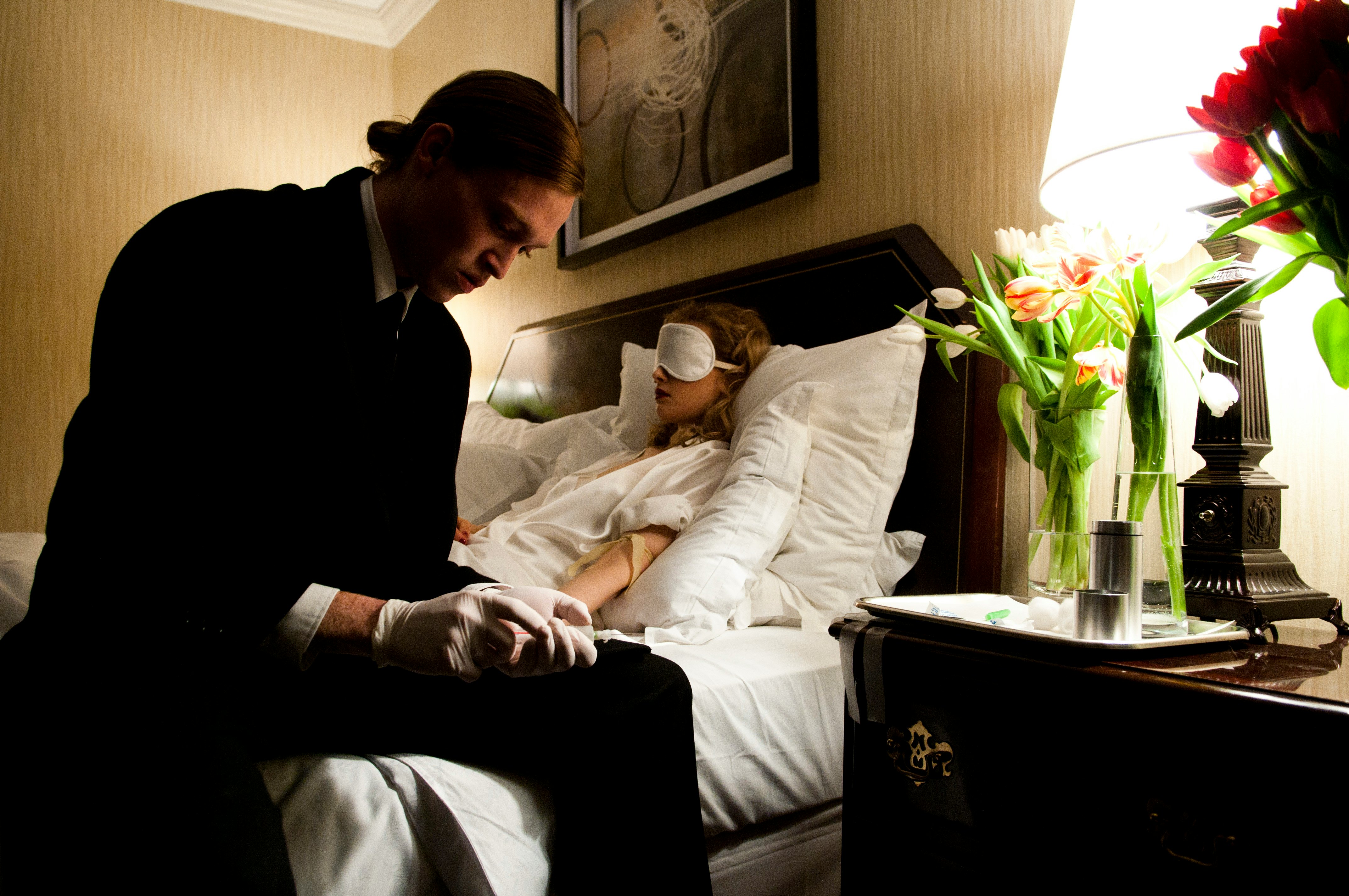
By 2013, it had been nearly 15 years since genre icon David Cronenberg left behind his body-horror roots in favor of more mature — albeit still dark and horrific — dramas. While the elder Cronenberg was directing Oscar-nominated films like Eastern Promises and A History of Violence, a new Cronenberg generation was emerging to take on the mantle of disturbing audiences with the grotesquerie of the human body. Antiviral, Brandon Cronenberg’s debut feature would mark him as the heir apparent to his father’s legacy.
Brandon Cronenberg’s subsequent films, 2020’s Possessor and 2023’s Infinity Pool, have received wider acclaim and success, but Antiviral finds much of his style and themes already fully formed. It’s easy to see the influence of his father in Cronenberg’s films, but he also has his own ideas about capitalism, identity, and fame, all of which play into Antiviral. Visually, it’s a starker film than the often psychedelic Possessor and Infinity Pool, but it’s full of striking, disquieting images. There’s a hallucinatory quality to all of Cronenberg’s films that begins with the fever dreams of Antiviral.
Those are literal fever dreams, because protagonist Syd March (Caleb Landry Jones) deals in black-market viruses, which he smuggles out of his workplace by injecting them into his own body. Cronenberg drops the audience directly into this strange alternate version of 2011, without any initial explanation of what Syd does at the antiseptic-looking Lucas Clinic. The matter-of-fact approach to bizarre institutions and industries is a hallmark of the younger Cronenberg’s work, and it begins here with the mundane chatter of Syd and his co-workers as they prepare to infect their clients with viruses harvested from celebrities.
It’s not hard to imagine fandom taken to the level at which people would pay to receive the same flu or herpes viruses that once coursed through the veins of their chosen idols. Anyone who pleads, “Step on me” to a celebrity online is only one step away from that already. Antiviral’s depiction of celebrity culture is both absurd and oddly believable, with “celebrity” as a sort of all-purpose designation entirely divorced from talent or accomplishments. “Celebrities are not people,” says the head of the Lucas Clinic. “They’re group hallucinations.”

They may be deliberately dehumanized, but the celebrities in Antiviral definitely are people, and their human vulnerability is what allows them to market their illnesses to eager fans. Lucas’ star client is Hannah Geist (Sarah Gadon), a fragile beauty whose value lies entirely in selling off pieces of herself, whether those are the viruses she provides to Lucas or the cloned muscle cells that are grown into cuts of meat for fans to consume. “I don’t understand how this isn’t considered cannibalism,” Syd says to Arvid (Joe Pingue), owner of a celebrity butcher shop and dealer in illicit viruses.
The line between fandom and cannibalism is a thin one in Antiviral, and the people in line outside Arvid’s store or in the waiting room at the Lucas Clinic don’t seem too concerned with the distinction. Syd is happy to exploit their obsessions, on both sides of the law, until he finds himself in a situation he can’t control, after being sent on a “house call” to take a new virus sample from Hannah. He recklessly injects himself with her blood, sitting on a public toilet like a junkie with a needle in his arm, and ends up with a possibly fatal, incurable infection. Even as Syd suffers from fever, nausea, hallucinations, and eventual bleeding from the mouth, he himself becomes a commodity, the only vector for the designer disease that has taken down Hannah Geist.

For all its twisted, gross trappings, Antiviral is essentially a corporate espionage thriller, with Syd first as the operative and then as the asset, caught between two powerful celebrity-virus labs and the thriving underground marketplace. Jones excels at playing creepy weirdos, and he makes Syd shifty and off-putting from the start.
The whole world of Antiviral is deliberately off-putting, a mix of ultra-clean white spaces and grimy back rooms, and every aspect of the celebrity bio-marketing business is ornately disgusting. Arvid cultivates a nasty-looking “cell garden” to grow his extremely unappetizing steaks, and the machine that Syd uses to copy-protect viruses marks them with individual designations that are rendered as distorted images of human faces. It’s all fascinatingly inexplicable, and Cronenberg presents it with confidence and style.
A line about Hannah’s rumored extra non-functional organ connects Antiviral to David Cronenberg’s eventual return to body horror with 2022’s Crimes of the Future. The Cronenbergs may in fact be influencing each other, feeding into a familial fascination with biological deviance. That fascination is already on full freaky display in Antiviral.







